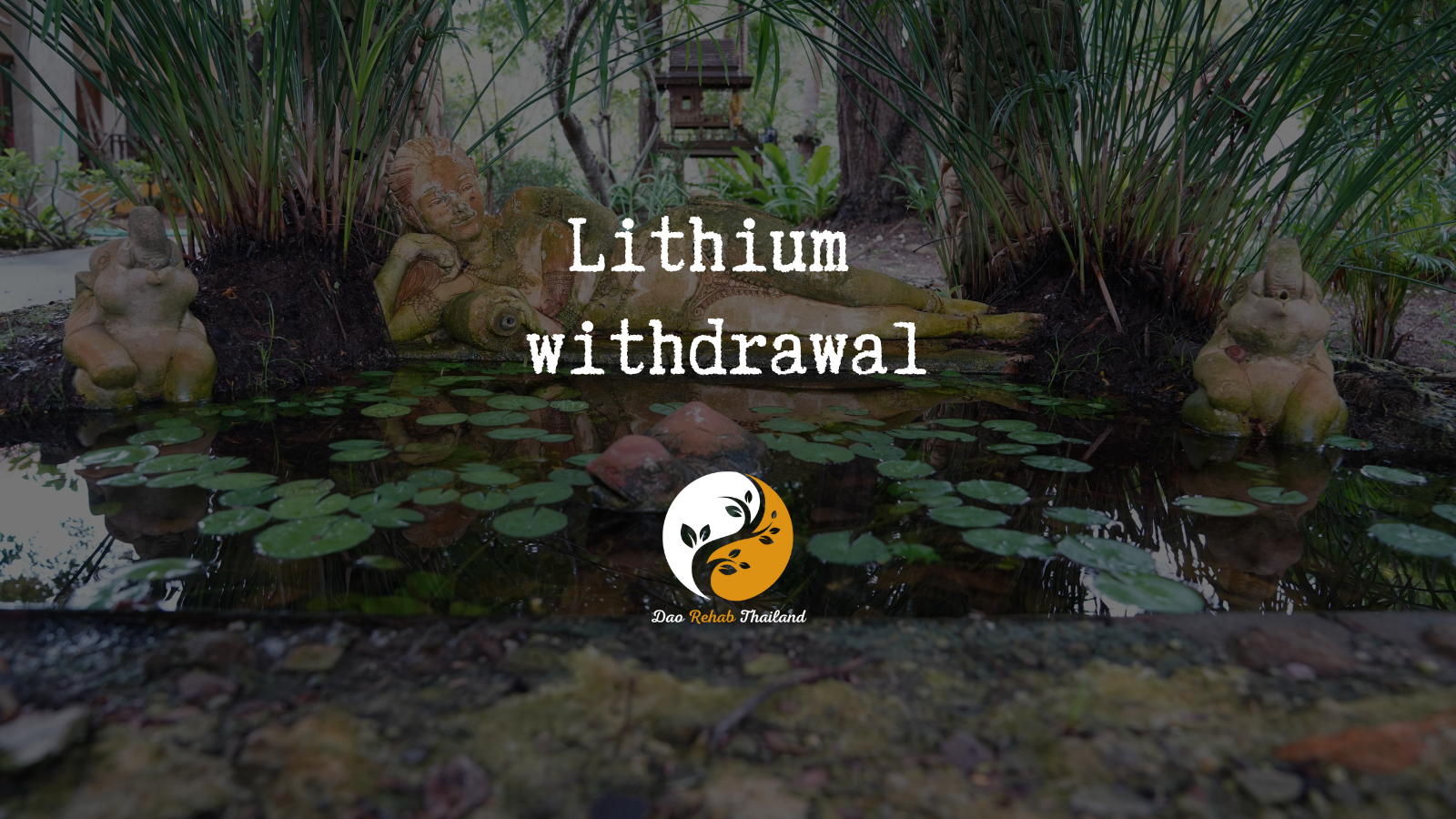
Lithium withdrawal in thailand
Lithium withdrawal
“Turning the impossible into possible”

"Detox from Lithium at a Luxury Holistic Center in Thailand and Israel"

Detox from Lithium
Lithium withdrawal can be a challenging process that requires professional supervision, as lithium is a medication used to treat mood disorders like bipolar disorder and helps stabilize mental health. The process involves a gradual and controlled reduction in dosage to minimize the likelihood of withdrawal symptoms or a worsening of mental health.
"Holistic Center for Trauma, Addiction, and Mental Imbalance Treatment in Thailand"
“Come to the beginning of your journey to freedom from addiction to alcohol, drugs, and pills, and rediscover your life within the serene embrace of DaoTherapy Rehab in Thailand—where holistic healing meets empowering recovery.”
DaoTherapy Holistic Rehab
Key Elements of Lithium Detox:
Medical Supervision: Lithium detox must be conducted under medical supervision, as the body may experience withdrawal symptoms. These can include nausea, anxiety, muscle aches, and insomnia. A medical team will monitor and manage these symptoms to ensure the patient’s safety and comfort.
Holistic Therapies:
Holistic Therapies: Many detox programs incorporate holistic therapies such as mindfulness, yoga, and meditation to help individuals cope with stress and anxiety during the detox process. These therapies support the mind-body connection and contribute to overall recovery.
Tapering Process
Tapering Process: Lithium detox often involves a gradual tapering of the drug to reduce withdrawal severity. Doctors will slowly decrease the dosage over time to allow the body to adjust to lower levels of the substance.
Psychological Support:
Psychological Support: Like any addiction recovery process, detox from Lithium includes psychological support. This can involve counseling, therapy, or support groups to address the mental and emotional aspects of addiction.
Post-Detox Treatment:
Post-Detox Treatment: After completing detox, continuing treatment is crucial to prevent relapse. This often includes participation in ongoing therapy, group support, and the development of new coping strategies to maintain sobriety.
General Background and History of Lithium:
Lithium is a naturally occurring element and one of the oldest medications used in psychiatry, particularly for treating mood disorders such as bipolar disorder. Its use dates back to the 19th century when it was initially used to treat a variety of physical conditions, including gout and kidney stones, due to its ability to dissolve uric acid. By the mid-20th century, researchers discovered lithium’s effects on mood stabilization, which marked a turning point in the treatment of mental health conditions.
Early Use and Discovery:
In the 1940s, Australian psychiatrist Dr. John Cade observed that lithium could reduce agitation in patients with bipolar disorder. His discovery revolutionized psychiatric treatment by offering one of the first effective treatments for bipolar disorder, reducing symptoms of mania and preventing relapses. Lithium was approved for medical use in the United States in 1970 and became widely accepted as a treatment for both the manic and depressive episodes associated with bipolar disorder.
Lithium in Modern Psychiatry:
Today, lithium remains one of the most effective mood stabilizers, commonly prescribed to reduce mood swings in bipolar disorder, prevent manic episodes, and manage depressive symptoms. It has also been found to have neuroprotective properties, potentially benefiting brain health by protecting neurons from damage.
However, due to its narrow therapeutic range, lithium requires careful monitoring, as too high a dosage can lead to toxicity, with side effects that may impact kidney and thyroid function. Despite these challenges, lithium continues to be a cornerstone in the treatment of mood disorders, valued for its unique effectiveness in stabilizing mood over the long term.

contact us
Contact us with your questions
We would love to speak with you! Feel free to reach out with any questions.

get in touch
Schedule a free consultation
Schedule a free consultation with our team and let’s make things happen!
What You Need to Know About Lithium Withdrawal:
Lithium withdrawal requires careful management and professional oversight due to the essential role lithium plays in stabilizing mood for those with conditions such as bipolar disorder. Here’s what to consider:
1. Gradual Reduction:
– Tapering Off: Lithium must be tapered off gradually under medical supervision to minimize withdrawal effects and prevent mood destabilization.
– Risk of Relapse: Abrupt discontinuation can lead to a return of symptoms such as mania or depression, often more intensely than before.
2. Withdrawal Symptoms:
– Physical: Headaches, fatigue, dizziness, muscle weakness, and sometimes nausea can occur.
– Mental and Emotional: Heightened anxiety, mood swings, irritability, or even a return of depressive or manic symptoms.
3. Monitoring Mood Stability:
– Medical Supervision: Regular check-ins with a healthcare provider are critical to monitor for any mood changes or signs of relapse.
– Psychological Support: Having a counselor or therapist available can help manage mood fluctuations or anxiety during this period.
4. Alternative Treatments:
– Medication Adjustments: Other medications may be introduced to support mood stability if lithium is discontinued.
– Lifestyle Support: Incorporating meditation, mindfulness, regular exercise, and sleep routines can help stabilize mood.
5. Long-Term Considerations:
– Kidney and Thyroid Monitoring: Lithium can affect kidney and thyroid function, so ongoing monitoring is advised.
– Patient-Specific Plan: Withdrawal plans are personalized, as each patient’s response to lithium discontinuation varies.
Lithium withdrawal requires time and patience, with consistent support from medical and mental health professionals. With careful management, individuals can navigate this process effectively.
Characteristics of Lithium Addiction:
Lithium itself is not considered addictive in the traditional sense, as it does not produce cravings or the “high” associated with addictive substances like opioids or stimulants. However, there are some factors that may lead individuals to feel dependent on lithium, especially when it’s used for mood stabilization in conditions like bipolar disorder.
Key Characteristics of Lithium Dependence:
1. Psychological Dependence on Stability:
– Individuals who experience significant improvement in mood stability may develop a psychological reliance on lithium, fearing a return of symptoms if they discontinue the medication.
– Patients often feel anxious about the possibility of relapsing into depressive or manic episodes if they stop lithium treatment.
2. Physical Dependency Due to Tolerance and Withdrawal:
– While lithium does not cause physical tolerance like many addictive drugs, the body does adapt to its presence. Discontinuing lithium suddenly can lead to withdrawal-like effects, including mood destabilization and physical symptoms such as fatigue and headaches.
3. Reliance on Regular Dosing:
– Lithium has a narrow therapeutic window, meaning the dosage needs to be carefully regulated to be effective and avoid toxicity. This need for precise, regular dosing can create a sense of dependence on the medication regimen itself.
4. Long-Term Health Monitoring:
– Regular blood tests are required to monitor lithium levels, kidney function, and thyroid function, creating a structured dependency on medical support and check-ups.
5. Challenges with Discontinuation:
– For some, reducing or stopping lithium can lead to the return of mood symptoms. This difficulty in discontinuing treatment, particularly without a relapse, can feel like a form of dependency.
While lithium dependency is not the same as addiction, there is often a psychological and physical reliance on its mood-stabilizing effects for people managing certain mental health conditions.
More Severe Side Effects of lithium:
Lithium, while effective as a mood stabilizer, can lead to more severe side effects, particularly when blood levels rise above the therapeutic range. Severe side effects may require immediate medical attention and can impact long-term health.
1. Lithium Toxicity:
– Symptoms: Nausea, vomiting, severe diarrhea, tremors, muscle weakness, confusion, seizures, and in severe cases, coma.
– Causes: Toxicity can occur from high doses, dehydration, kidney impairment, or interactions with other medications that affect lithium levels.
– Management: Blood levels need regular monitoring to prevent toxicity, and treatment may include IV fluids, dialysis, or discontinuing lithium in severe cases.
2. Kidney Impairment:
– Chronic Kidney Disease (CKD): Long-term lithium use can cause kidney damage, leading to reduced kidney function and, in some cases, chronic kidney disease.
– Symptoms: Increased thirst, frequent urination, electrolyte imbalances, and, in severe cases, kidney failure.
– Monitoring: Regular kidney function tests are essential to catch early signs of impairment.
3. Thyroid Dysfunction:
– Hypothyroidism: Lithium can disrupt thyroid function, leading to hypothyroidism, a condition in which the thyroid produces too few hormones.
– Symptoms: Fatigue, weight gain, sensitivity to cold, depression, and hair loss.
– Management: Routine thyroid function tests; thyroid hormone supplements may be required if hypothyroidism develops.
4. Cardiac Issues:
– Arrhythmias: Lithium can affect heart rhythm, leading to conditions such as bradycardia (slow heart rate) or other arrhythmias.
– Symptoms: Dizziness, fainting, palpitations, and fatigue.
– Monitoring: Heart monitoring and EKGs may be necessary for individuals with cardiac risk factors.
5. Neurological and Cognitive Effects:
– Cognitive Impairment: Some users report memory issues, slowed processing, and difficulty concentrating.
– Tremors and Muscle Weakness: Hand tremors, muscle twitching, and weakness may increase at higher doses.
– Severe Cases: Rarely, lithium toxicity can lead to neurotoxicity, causing severe confusion, ataxia (loss of coordination), and seizures.
6. Weight Gain:
– Metabolic Impact: Weight gain is a common side effect, which can be compounded by hypothyroidism.
– Management: Lifestyle adjustments, diet, and regular physical activity can help manage weight.
Regular medical follow-up, including blood tests for lithium levels, kidney function, thyroid function, and heart health, is critical to catch and manage these severe side effects early.
Psychological Support:
Psychological Support: Like any addiction recovery process, detox from Subutex includes psychological support. This can involve counseling, therapy, or support groups to address the mental and emotional aspects of addiction.
Information about lithium and Its Mechanism of Action:
Lithium is a naturally occurring element commonly used as a mood stabilizer, especially for treating bipolar disorder. Although it has been used for decades, its exact mechanism of action is still not fully understood. However, researchers have identified several ways lithium affects the brain and body that likely contribute to its mood-stabilizing effects.
Mechanism of Action
1. Impact on Neurotransmitters:
– Inhibition of Excitatory Neurotransmitters: Lithium reduces the activity of excitatory neurotransmitters such as dopamine and glutamate, which are often linked to mania and mood instability. By decreasing their effects, lithium can help stabilize mood swings.
– Boosting Serotonin: Lithium is believed to increase serotonin transmission, which can help reduce depressive symptoms and promote a sense of well-being.
2. Regulation of Ion Channels:
– Stabilization of Electrical Activity: Lithium impacts the flow of ions, such as sodium and potassium, across cell membranes, which stabilizes the electrical activity of neurons. This helps reduce the rapid firing of neurons that can contribute to mood swings.
3. Neuroprotective Effects:
– Promoting Brain Health: Lithium has neuroprotective properties, as it is believed to increase levels of brain-derived neurotrophic factor (BDNF), a protein that supports neuron growth and survival. By encouraging neuron health, lithium may help protect the brain from damage associated with mood disorders.
– Gray Matter Preservation: Studies have shown that long-term lithium treatment may help preserve gray matter volume in the brain, which can decline in people with bipolar disorder.
4. Modulation of Secondary Messengers:
– Inhibition of Inositol Monophosphate: Lithium affects inositol monophosphate, a compound involved in cell signaling. By inhibiting this pathway, lithium may help reduce mood swings.
– GSK-3 Inhibition: Lithium also inhibits an enzyme called glycogen synthase kinase-3 (GSK-3), which is involved in cell signaling and is thought to play a role in mood regulation. This inhibition can help stabilize mood and reduce symptoms of mania and depression.
Primary Uses
– Bipolar Disorder: Lithium is most commonly used to prevent manic and depressive episodes in bipolar disorder.
– Major Depressive Disorder: Sometimes used as an adjunct treatment to enhance the effects of antidepressants in patients who do not respond fully to standard treatments.
– Schizoaffective Disorder: Lithium can also help manage mood symptoms in certain cases of schizoaffective disorder.
Lithium Monitoring and Safety
Due to its narrow therapeutic range, lithium levels in the blood must be closely monitored. Side effects and risks, such as lithium toxicity and kidney or thyroid dysfunction, require regular medical check-ups. However, when monitored carefully, lithium remains one of the most effective treatments for long-term mood stabilization in bipolar disorder and other mood conditions.
Physical Withdrawal Symptoms of Lithium:
Physical withdrawal symptoms from lithium can vary in severity and often depend on how gradually the medication is reduced. Stopping lithium abruptly can lead to a resurgence of mood symptoms and physical withdrawal symptoms. Here are some common physical symptoms associated with lithium withdrawal:
1. Headaches: Often a result of changes in blood chemistry or re-adjustment after discontinuation, headaches are common during withdrawal.
2. Fatigue and Weakness: Patients may experience low energy levels, muscle weakness, or an overall sense of fatigue as the body adjusts to functioning without lithium.
3. Nausea and Digestive Issues: Nausea, upset stomach, or other gastrointestinal disturbances can arise, particularly if the withdrawal process is abrupt.
4. Dizziness or Lightheadedness: Dizziness may occur as the body re-establishes its electrolyte balance and blood flow after discontinuing lithium.
5. Increased Thirst and Urination: Lithium affects kidney function, and stopping it may lead to changes in thirst and urination patterns.
6. Tremors and Muscle Spasms: Some people experience hand tremors, muscle twitching, or spasms, which can occur as the body adjusts to the absence of lithium’s stabilizing effects.
7. Sleep Disturbances: Difficulty sleeping, insomnia, or disrupted sleep patterns can accompany lithium withdrawal.
These symptoms highlight the importance of gradual tapering and medical supervision. Close monitoring can reduce physical discomfort and help manage any return of mood symptoms.
Psychological Support:
Psychological Support: Like any addiction recovery process, detox from Subutex includes psychological support. This can involve counseling, therapy, or support groups to address the mental and emotional aspects of addiction.








